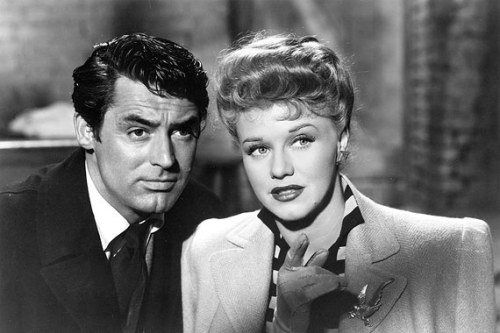 Feb. 3, 2011
Feb. 3, 2011 28. Once Upon a Honeymoon (1942)
Starring Cary Grant, Ginger Rogers, Walter Slezak, Albert Dekker, Albert Basserman
Directed by Leo McCarey
Plot: “In pre-WW2 Europe, a woman notices that wherever her husband goes, the Nazis seem to follow. Meanwhile, a charming reporter is following them…” (from IMDb)
This film is an uneven blend of serious wartime drama, romance, and comedy. Despite genuine moments in each of these genres, the film does lag significantly in parts. Add to that a storyline revolving around the serious subject matter of the Nazi over-take of Europe and deportation of Jews, and the audience isn’t sure what to think—or when to laugh and when to cry. As for the acting, although at least one contemporary critic praised Ginger as giving one of her best performances, I could not agree. She evens out as her character matures, but near the beginning she is all over the map. I am usually a fan of Ginger, but in this film she sporadically uses and drops an accent, and sometimes just acts really odd. Cary, on the other hand, was extremely charming and enjoyable in this role. It’s watching films like this—where he is so full of life and spontaneity—that reminds me why I prefer his earlier screen roles to the later, more hardened image he adopted in the ’50s and ’60s. But back to the movie… It’s not an altogether awful film, but somehow it just doesn’t mesh.
For better old films set against the onset of the Second World War in Europe, I recommend:
For comedy: Lubitsch’s To Be or Not to Be (1942)
For suspense/drama: Hitchcock’s Foreign Correspondent (1940)
I’m drawing a blank on the romance angle, though I’m sure that there is one out there.

I completely agree. While Once Upon a Honeymoon does have some good moments, for the most part it's very uneven. The ending left me in a mild state of shock. Was Walter Slezak going over the side of the boat supposed to be very dramatic or funny?
ReplyDeleteIt's not one of the best movies ever made, but I'll probably watch t again sometime because (like you said) Cary is so fun to watch in roles like this.
It's good but what is frustrating is that it could've been so much better! And I agree with you about the end. I was just like "wait, whhhaaat?"
ReplyDelete